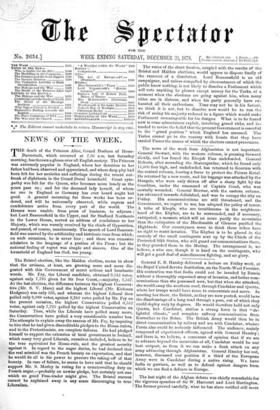The last night of the Afghan debate was chiefly remarkable
for the vigorous speeches of Sir W. Harcourt and Lord Hartington. The former proved carefully, what he has since verified still more carefully in his letters to the Times, that it was not till Lor Lytton frightened the Ameer into the arms of Russia that th correspondence between Afghanistan and Russia became in an way dangerous ; he remarked on the qualities of a Scotchman attributed by Lord Salisbury to Lord Lytton, which he said Lord Lytton understood as a compliment to what Yankees call "smart ness," " though it had other names in other countries," and treated Government as having placed itself in the position of a "ruined gamester," who, having attempted suicide and " half-cut " his throat, goes to his friends to know what to do. Lord IIarting- ton gave the Government the advice to recall Lord Lytton, though he admitted that the country could hardly part with Lord Lytton " without parting with something else." Sir S. Northcote warmly protested against the Marquis of Hartington's attack on the Viceroy, and described his whole speech as meant for the hustings, not for the House of Commons ; but his own defence amounted to little more than this, that Lord Salisbury and himself were the last people to whom a policy of annexation should be attributed. As to himself, we should agree, but then what weight has he in the Government ? The vote of censure was defeated by a majority of 101,-328 against 227,—and thirty Members paired. The number of votes and pairs taken together (including the four tellers) was 389,—so that there was a considerable number of absentees, chiefly Liberals.
yminutely the proofs we had given of the unsound character of







































 Previous page
Previous page